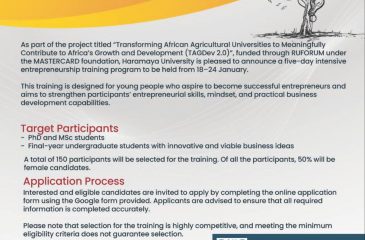Haramaya University in collaboration with world resource institute (WRI) and Institute for International Sustainable Development (IISD) received grant totaling 10.1 million Canadian dollar from Canadian government under IISD for project title “Scaling Urban NbS for Climate Adaptation in Sub-Saharan Africa (SUNCASA) Initiative, Dire Dawa Dechatu Project”.
The project is a physical implementation of output of a previously completed project entitled “Study and Design of Dechatu River Climate Resilience Green Infrastructure Initiative Project of Dire Dawa Administration, Ethiopia” funded by Dire Dawa Administration through its UIDP_ project and supervision of Dire Dawa City Environment and Climate change Authority which was led by Senior staff member of Haramaya University, Dr Asfaw Kebede, Associate professor of Hydrology and Water Resources Engineering.
SUNCASA project, is a unique project for Dire Dawa administration that focuses on green infrastructure mainly for flood protection and focusing on gender and disabilities. The project is one of three projects funded by Canadian government in three countries (Ethiopia-Dire Dawa, Rwanda- Kigali, and South Africa) with a total budget of 30.1 million CAD out of which 10.1 million CAD is for Dire Dawa SUNCASA project.
The agreement has been signed between the IISD and WRI, and kickoff meeting at Dire Dawa in the presence of City mayor. The project implementation plan preparation by Haramaya University, WRI, HCS, Environmental Authority and Agriculture Bureau will be done in the coming two months, which sets the deliverables among each partner.
Haramaya University is proud of his faculty members and honored to take the leading role in mobilization of fund for this project (research-based intervention). The university will use its reach experience in implementing the project.
Details of the project
Project Title:-Scaling Urban NbS for Climate Adaptation in Sub-Saharan Africa (SUNCASA) Initiative, Dire Dawa Dechatu Project
Project is focuses on 10 major activities that include
Afforestation, Agroforestry, Buffer zone establishment, Urban tree planting, Urban greening, DSS dashboard, Capacity building, Develop and implement a stakeholder engagement plan, design and implement awareness building campaigns and complete stakeholder agreements, Research and prepare best practice guides, training modules & finalize schedule for implementation of capacity building and skill development modules, Support time for work with IISD and WRI to develop economic analysis; create communication and media products; designing and implementing resilience, gender equity, and biodiversity monitoring protocols.
Funding organization
The Canadian government funded it under IISD. The total project budget for three cities in Africa (Dire Dawa, Kigali and Johannesburg) is 30.1 million CAD, out of which 10.1 Million CAD is for Dire Dawa SUNCASA project.
Project outcome
The general outcome “Enhanced climate adaptation, gender equality, and biodiversity protection in urban communities,”
Some of the specific outcomes are:-
- Increased capacity of local partners to value and assess effective gender-responsive NbS options for watershed conservation and restoration in urban communities
- Increased capacity of local stakeholders, especially women, to build partnerships and engage effectively with existing governance frameworks to ensure development of gender-responsive NbS
Project Duration
Duration of the project is two years and three months.
Project team and partners: – the project technical lead is Haramaya university (Asfaw Kebede –PI, Kibebew K. Co-PI, Solomon Estifanos, and Negash Tessema are members). From WRI-side there are team of expert to work on all activities in collaboration with HU. From IISD sider there are also a team of expert that overlooks the whole project activities representing the Canadian government. The project implementer is Harareghe Catholic secretariat (HCS), selected based on its history of achievement in the region for funded project implementation capacity related to Nbs. The city administration bureaus like Environmental Authority and Agriculture are the one facilitating the community mobilization and other issues related to the project implementation.




